 ACUA Ocean’s hydrogen-powered unmanned surface vessel PIONEER has completed the world’s first continuous 24-hour offshore operation under remote control with zero emissions, according to Cattewater Harbour's release.
ACUA Ocean’s hydrogen-powered unmanned surface vessel PIONEER has completed the world’s first continuous 24-hour offshore operation under remote control with zero emissions, according to Cattewater Harbour's release.
The sea trial took place off Plymouth, where the vessel sailed to the Eddystone Lighthouse, 12 nautical miles from its home berth at Turnchapel Wharf, and continued operations for 24 hours with Cattewater Harbour’s vessel Amy Jane providing support.
During the test, autonomous systems, vessel stability and hydrogen performance were monitored, and the collected data is being shared with research partners including the University of Southampton and MarRI-UK. PIONEER recently received certification under the UK Maritime and Coastguard Agency’s Workboat Code Edition 3 Annex 2, the first such approval for a remotely operated hydrogen-powered vessel.
According to ACUA Ocean CEO Neil Tinmouth, the certification and trials complete the company’s demonstrations under the UK Clean Maritime Demonstrator Competition, funded by the Department for Transport.
Cattewater Harbour CEO and Harbour Master Richard Allan said the registration of PIONEER as a coded vessel is “pioneering” and highlighted the role of Turnchapel Wharf in supporting innovation in maritime autonomy.
PIONEER will be presented at the Defence and Security Equipment International exhibition and London International Shipping Week in September.
ACUA Ocean Ltd is a UK-registered company specialising in the development and deployment of unmanned surface vessels powered by alternative fuels. The company focuses on applications in offshore operations, environmental monitoring and maritime security.
Cattewater Harbour Commissioners is a statutory harbour authority responsible for managing Cattewater Harbour in Plymouth, UK. The organisation oversees safe navigation, regulatory compliance and supports commercial and innovation projects within the harbour.



